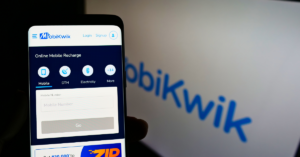In 2014, the National Highway Authority of India introduced the concept of FASTag, a radio frequency identification tag, to make toll collection cashless and faster. This was followed by a surge in toll payment collections—from 16% in 2016-17 to over 96% in 2021-22.
Other than collecting tolls, the existing FASTag infrastructure is ripe for further utilisation.
To enable autonomous vehicle payments, Luke Sequeira and Aprup Shet jumped on the opportunity to take advantage of the infrastructure and founded Goa-based in 2016 as a vehicle interface platform for building apps and APIs.
The software-as-a-service (SaaS) startup, which built its vehicle payment technology using the FASTag ecosystem, offers a simplified solution for banks, as well as logistics and automotive OEMs (original equipment manufacturers), to issue FASTags. It also provides an engagement platform for end users and software for vehicle payments.
“We are a payments company that enables and simplifies vehicle payments,” Luke, CEO and Founder of Numadic, tells YS. “Numadic helps to automate and digitise these payments and integrate with banks, insurance companies etc, to build the underlying infrastructure.”
The problem statement
Since 2016, the company has been working in the fleets payments space. It worked with large organisations to track third-party fleets via GPS and issue invoices.
Luke realised that while the freight and logistics space was crowded with many players, there was little innovation happening in digitising vehicle payments.
At the same time, the country was seeing a surge in UPI adoption due to demonetisation and increased internet penetration.
“It is a matter of a few fractions of a second or a few seconds faster that makes payments even simpler and acceptable,” Luke says.
He realised that to make payments at the fuel station, vehicle owners had to reach for their wallets or smartphones. The founders started working on this gap of automated payments in 2017-18 and pivoted from the operational side of fleet management to the transactional aspect.
“Payments need to be digitised much before vehicle movement is automated. This business opportunity comes at the right time as vehicle payments will be completely automated over the next five to 10 years,” he adds.
While the company faced the initial challenges typical to most startups—such as dealing with large enterprises that don’t pay on time, it also faced difficulties in hiring senior talent in Goa as it was not being taken seriously for being a Goa-based startup.
“For a small company like Numadic to grow, getting access to senior talent was critical and we were able to achieve that in a year. Also, it is not common for companies from Goa to be known in the tech space in India,” says Luke.
He says that until recently, Goa neither had the infrastructure nor a latent talent pool to hire from. Also, until recently, Goa wasn’t able to attract people to work long-term.
“But the approach has changed since the onset of COVID-19 with remote working now becoming more acceptable, and Goa is being seen with a little bit more seriousness,” he adds.
As vehicle payment was a new concept, the team faced scepticism about the problem statement, the solutions on offer, and whether it could deliver.
Numadic’s Transaction and Issuance
The solutions
Numadic works with enterprise customers to whom it licences its proprietary SaaS platform on a flat fee based on the number of active users and revenues from certain types of transactions.
“It took us about three-and-a-half years to get to the point where the platform was monetisable and stable. And now, we have multiple teams building on top of our platform,” says Luke.
The B2B company offers two full-stack vehicle payment solutions.
NU Issuance handles the digitisation of FASTag purchases for various platforms like Google Pay, Amazon etc, along with apps for banks, and enables the sale and purchase of FASTags and similar vehicle products.
Meanwhile, NU Toll provides mobile and web applications for digital tolling, user success monitoring, and toll transaction analytics. It digitises the recharging, reporting and ongoing management of FASTag and similar vehicle payment products.
The startup develops FASTag APIs using the FASTag network built by National Electronic Toll Collection (NETC) for leading FASTag issuer banks in India, enabling third parties to build applications atop vehicle transactions, credits and debits, etc. It provides the infrastructure to use FASTags at places such as fuel stations, parking spots, traffic stops for fine collection, etc.
“So rather than doing multiple integrations with different banks or oil companies, Numadic can rapidly deploy it over FASTag,” Luke shares.
The startup has tied up with Hindustan Petroleum and Indian Oil to use FASTags for fuel payments. The pilot began in October last year.
In 2021, using scanning tags developed by Numadic, ICICI Bank and IDFC First Bank also launched FASTag-enabled fuel payments at select outlets by tying up with petroleum companies like Indian Oil and Hindustan Petroleum.
While the company is currently focusing on fuel payments, it has plans to build fine collection software.
Numadic Team
The team
Numadic raised $2.5 million in a Pre-Series A funding round led by 9Unicorns and Venture Catalysts in October 2021. It has close to 39 members.
Luke is a tech entrepreneur and has worked in technology roles across India, Canada, and Europe. He is also the founder of StartupGoa.org, through which he aims to help sprout tech startups from the Goan soil.
Aprup Shet, Co-founder and VP of Partnerships, also co-founded StartupGoa.org. He was also the co-founder of alcohol delivery startup HipBar, which was recently acquired by CRED.
“We doubled our revenue the last financial year and we are on track to triple our revenue this FY. Because of the downturn in the funding environment, we have slowed down on some aspects of our business with respect to cash reserves, and expect to break even by the third quarter of next year,” Luke says.
“Depending on the environment, we may push and be more aggressive towards growth, but we are taking a balanced approach right now; and we will wait and watch, and tune up,” he adds.
Market opportunity
Numadic has processed over $1 billion in gross transaction value. It competes with , a Gururgam-based startup that uses FASTags for payment at parking lots.
According to Juniper Research, the global transaction volume of in-vehicle payments will exceed $4.7 billion by 2026—up from just $87 million in 2021.
“We are playing an active part in digitising fuel payments. Other companies are focusing on different aspects like parking. We see this playing out over the next few years; a large chunk of fuel stations in India will be digitised where a vehicle will just have to fuel up and drive on,” he signs off.









